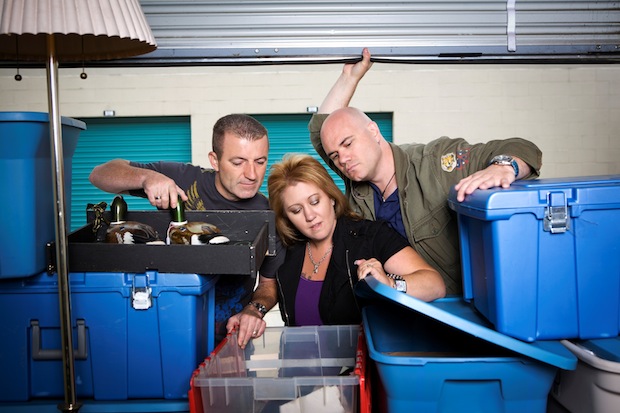Half-term again, so naturally all my TV viewing plans have gone out of the window. In some households — my bearded Victorian brother Dick’s, for example — parents still cleave to the old-fashioned values whereby a sofa-blocking child in front of the TV is instantly ejected should its father or mother wish to watch something else.
But I’d never dream of doing it to ours. When they’re teenagers and when they’re away so much of the time at boarding school, you’re pathetically grateful for whatever crumbs of companionship they are prepared to offer you. So if you happen to find them slumped in the sitting room watching some utter crap like Storage Hunters, the last thing you do is insist they turn over to some improving documentary on macroeconomic theory. Instead, you quietly settle down next to them — hoping they won’t be so appalled by your presence that they flee to their bedrooms — and enjoy.
And you know what? Storage Hunters (Dave) isn’t that crap, actually. It’s a worryingly compulsive American reality TV series, set mainly in California, about the white trash folk who earn their livings by bidding for the contents of self-storage containers whose tenants have failed to pay their bills.
What makes it so exciting is that these auctions are conducted blind. You’re allowed to peer through the door of the storage space — usually a shipping container whose padlock is ceremoniously boltcut open by the auctioneer’s assistant — but not actually to enter or touch anything. Since the most valuable contents (cars, for example) tend to be covered by a tarpaulin, this makes every bid something of a punt. Sometimes you win big, like the couple who bid just over $1,000 for what turned out to be a $12,000 hot-air balloon; quite often you lose, like the disappointed fellow who paid $105 for nothing but boxes of waste paper.
So really it’s a bit like an American version of Antiques Roadshow: brasher, coarser and much quicker to get to the only bit any of us really cares about — the ‘reveal’, where we find out whether the thing in question is worth gazillions or absolutely zilch.
I do have my doubts, though, about the accuracy of the contents’ valuations flashed up on the screen. Is this what the bargain-hunters actually fetched when they sold all that dusty bric-a-brac or is it closer to what they’d like to get, in their dreams?
This is the problem with reality programmes these days. Everything is now so completely fabricated and dishonest — see, say, Made in Chelsea — that it might just as well have been scripted and performed by bad actors. Actually, come to think of it, that’s exactly what is happening on these shows: ordinary members of the public, like the one on Storage Hunters with the knuckleduster on a chain round his neck who thinks he’s butch but talks suspiciously camp, sniff the opportunity of TV semi-celebrity and ham it up as if their careers depend on it. Channel 4’s The Word saw this coming long ago, when it had that horrible section in which people did revolting things like eat worms or lick sweat off fatties before saying to the camera: ‘I’ll do anything to be on TV.’
Consider another example: Bakery Boss (TLC) — which, as most parents of teenage girls will know, stars Buddy, proprietor of the New Jersey bakery made internationally famous by Cake Boss. In this new series, Buddy does a Gordon Ramsay, visiting failing bakeries and attempting to turn them around.
In the episode I saw, Buddy went to a supposedly traditional Jewish bakery in Queens, which, instead of baking its specialities fresh on the premises, bought them in from an outside supplier. This, apparently, was because the Jewish momma in charge of the enterprise had so little faith in the talents of her son and his staff she couldn’t bear to let them loose on the recipes she’d known in her Hungarian childhood. But the bought-in stuff was so inferior that none of the locals liked it, preferring to go to the nearby supermarket instead. As a result, the bakery was on the verge of closure.
Do we believe this narrative? Really? I would concede that all the characters played up to it very well — the momma, in particular, being spectacularly intransigent. Against that, though, as with Gordon’s Kitchen Nightmares, these ailing bakeries and restaurants have a strong vested interest in portraying themselves as total basket cases. After all, if they succeed, they get a free makeover, free state-of-the-art equipment and free publicity. For those kind of returns I’d black up, pretend to be mad, strip, put on a fake accent, wrestle with sharks, anything. Wouldn’t you?







Comments